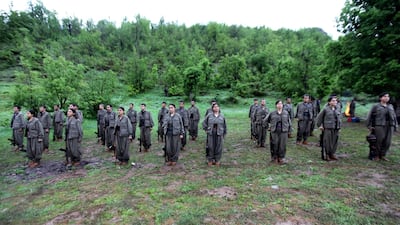In an apparent effort to gain concessions from Turkey on the issues of arms sales and creating an internationally-monitored safe zone in Syria, the Trump administration renewed on Friday the designation of the Kurdistan Workers’ Party (PKK) as a terrorist organisation.
The US State Department issued a statement announcing that it “has reviewed and maintained the Foreign Terrorist Organisation (FTO) designation of the PKK”. The militant group was first designated in October 1997 and the US has offered financial rewards for information on three of its leaders.
“The United States maintains a strong commitment to our partnership with our NATO ally Turkey, including fighting PKK fundraising operations in Europe and elsewhere”, the statement read. While the move reiterates a longstanding US position on the PKK, its timing comes as a US inter-agency delegation is visiting Ankara and negotiating a range of issues between the two NATO allies including Syria, the sale of Patriot missiles, trade and counter terrorism.
The meetings were the second this month between Washington and Ankara. The talks began on Wednesday and were due to conclude Friday, but it is unclear if they reached a breakthrough.
Turkish foreign minister Mevlut Cavusoglu confirmed that the discussions entailed the sale of a US Patriot missile defence system to Ankara. “The United States said they could sell Patriots, and the delegations are negotiating," Mr Cavusoglu said on Friday, Turkish news agency Anadolu reported. However, issues relating to the time frame of delivering the $3.5 billion and Turkey’s purchase of S-400 missiles from Russia are complicating the talks, and remain unresolved.
US officials have insisted that if Ankara goes ahead with its purchase from Russia, then the Patriots deal will be withdrawn. "The S-400 will be delivered towards the end of this year in autumn. We bought S-400s because we could not purchase Patriots," Mr Cavusoglu was quoted as saying.
Nicholas Heras, a senior fellow at the Centre for New American Security, said the US-Turkish talks involve a number of trade-offs between the two states.
“The US is trying to gather enough carrots [incentives] to put into a basket to satisfy Turkish President Recep Tayip Erdogan's desire to show that he has strong national security chops, and re-designating the PKK is an easy carrot for Washington,” said Mr Heras.
The harder part, "will be whether the US can offer Mr Erdogan enough carrots that he will accept the US argument that the Syrian Democratic Force (SDF) needs to maintain its power and presence in northern and eastern Syria” Mr Heras added. For that purpose, the ”the US might actually need to eliminate the PKK leadership in Wadi Qandil” in Iraq.
US special representative for Syria James Jeffrey is with the delegation visiting Turkey. Washington is now seeking to leave around 400 of the 2000 US troops currently in Syria according to Bloomberg, seemingly abandoning the idea of a full withdrawal.
The US has also objected to a Turkish-controlled safe zone in Northern Syria and is instead offering to bring together an international force with the help of NATO and the Europeans to deploy in Syria. The size of such force is still being negotiated, and Turkey could participate with a small number, but it would a majority of other forces to range around 2000 troops.

